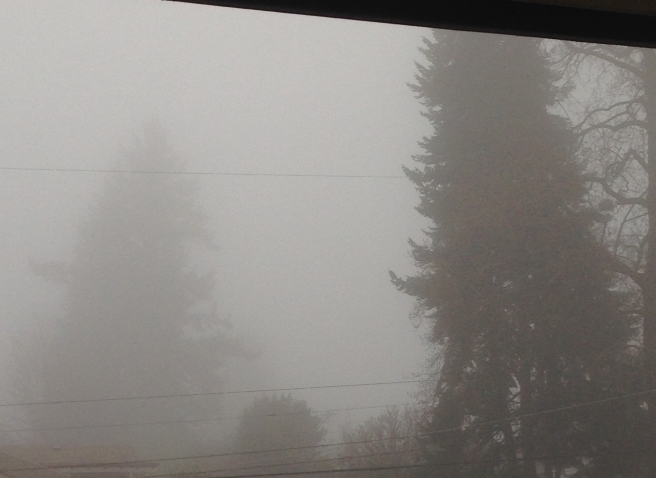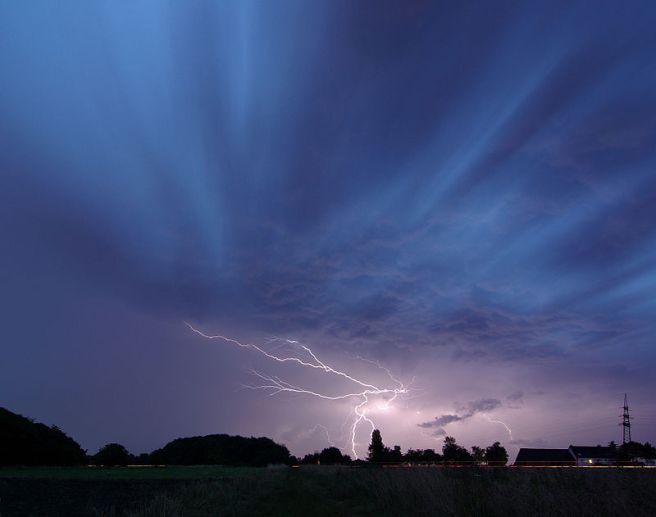This morning my husband left for a business trip well before the crack of dawn. Although it was dark, everything was white with fog. The world looked rather striking in the street lights—far too dramatic for the moment. As I kissed my husband goodbye at the door, I felt that our goodbye did not fit the setting. To match the weather we should have been parting under fraught circumstances. He should have lifted my chin and told me “we’ll always have Paris.” Or that he doesn’t “give a damn” where I go or what I do. Instead, he told me he’d text me from his gate.

It’s funny how something as scientific as the weather has taken on such emotional force in art. Storms are simply the products of. . . well, I’m no meteorologist, but they’re the products of things like hot and cold coming together, and yada yada. But we let the weather mean so much more to our experiences. Stormy, wet weather is moody or oppressive. Sunny weather is cheerful. Snowstorms and hurricanes are angry. Isn’t it interesting how we ascribe this kind of emotional symbolism to something so scientific?
According to a fascinating article in the New Yorker by Kathryn Schulz, this peculiarity of art has long been critiqued, especially in the nineteenth century when the science of weather was becoming better understood. As Schulz points out, leading critics decried the use of weather for symbolic purposes. She quotes John Ruskin:
“It is one of the signs of the highest power in a writer,” Ruskin argued, “to check all such habits of thought, and to keep his eyes fixed firmly on the _pure fact _”—on the “ordinary, proper, and true appearance of things.”
Ruskin and company were right of course. Relying on weather to convey mood is kind of a lazy thing to do as an artist. Of course the weather doesn’t match our moods. Atmospheric pressure and moisture and temperature don’t change simply because of our feelings. But when our moods and the atmospheric conditions do match, that fact can augment our experiences.
Cliches, as the saying goes, exist for a reason. Perhaps because we couldn’t make sense of its meaning for most of human history, the idea of weather as portent has become ingrained in us. It has come to take on a quality of otherworldly truth. And so it’s an ideal artistic device for suggesting not just the mood of an individual but the mood of the world at large. As if the environment around us—the space we inhabit, the culture we’re a part of—has a cohesive conscience.

I think this is one reason I love the paintings of Dutch landscape painter Jacob van Ruisdael. (And I’m a sucker for Romanticism, which loved to explore the emotional power of nature.) In 2005–6 the Philadelphia Museum of Art held a retrospective of Ruisdael’s work, about which their website says, “The tension between fiction and truth became more pronounced in his paintings than in any previous landscape art, creating a kind of landscape rich in accurate observation of the natural world and imbued with evocative symbolism. Considered the inventor of the Romantic landscape, his Jewish Cemetery, the most stirring and monumental of his imaginary scenes, transformed a humble graveyard near Amsterdam into astonishing allegories of the transience of life.” Can you imagine how different The Jewish Cemetery would be if it had a clear blue sky?
Of course—Ruskin be damned!—dramatic weather is a part of art everywhere. From Casablanca’s foggy conclusion to the infamous thunderstorms in Wuthering Heights. Imagine Casablanca without its foggy ending! Or a cheerfully sunny Wuthering Heights.
In my experience weather often is dramatic at dramatic times in our lives. I know intellectually that such moments are no more than coincidence and that the meaningful circumstances of those moments in my life has only caused me to remember the weather and to ascribe meaning to that weather. Nonetheless the weather is an important part of those memories, and I can’t help but feel that the world was somehow acknowledging significant moments in my life. I guess this is as close as I come to feeling religious.
To wit:
- My husband and I got married on New Year’s Day in northern Wisconsin. We wanted a winter wonderland wedding, and it was, to our minds, perfection. The morning after our wedding we woke up early—well before anyone else in our group—and decided to go on a walk. It was extremely cold but brilliantly sunny. The air was still and peaceful and we walked out onto the frozen lake behind the lodge where we’d gotten married the night before. The snow blanketed everything and the snow literally sparkled in the bright morning light. This crisp new day seemed to shine with promise. We had a bright start to the beginning of our married life. A clean slate.
- When I went into labor with my son in early April, Philadelphia was still under the thumb of winter. Everything was gray and drab. The night before I went to the hospital, my husband and I had dinner with my mother at a restaurant. On the walk back to our house, I remember facing a strong, damp wind, the collar of my winter coat popped up in a futile attempt to keep the cold away. The next afternoon, I went to the hospital. When I left the hospital several days later, I swear I felt like Rip van Winkle. Winter had vanished. All of the trees in downtown Philadelphia had blossomed soft pink and white. It was sunny and warm. We’d entered an early heat wave. I think temperatures were in the low eighties on the day we came home. This wonderful new little life had brought spring with it. I swear my son was responsible for the blossoming flowers and sunshine.
- My mother died early in the morning in the summer of 2016. We had taken her to the hospital with a fever and chills the afternoon before. Although I was worried about her, I was sure she’d be coming home before long. She’d been sick for a long time and had had many unplanned visits to the hospital for minor problems over the course of her illness. I was visiting my parents and took it upon myself to keep my sisters and husband apprised of her condition as it evolved over the course of the day. I’d periodically leave her room to make phone calls in front of the hospital, which was the only place I could get cell phone reception. On the second or third trip out front to give my sister an update, I walked through the hospital’s sliding doors right as a thunderstorm erupted. Gray clouds dramatically swirled and a massive crack of thunder greeted me just at the moment I walked outside. Rain began to pour down. This was no little rain shower with a low rumble of thunder. It was emphatic and loud and powerful. I remember thinking worriedly that it seemed like an ill omen. I began to worry about my mother’s condition more after that moment. Call me superstitious if you must.

Image: Rainer Knäpper, Free Art License (http://artlibre.org/licence/lal/en/)
This is all coincidence, I guess. I know. I can hear the skeptic’s voice. But coincidence or no, the weather has been on point at important moments in my life. I guess the novel of my life would be pretty cliche, subject to a scathing review from the likes of John Ruskin.

Marvelous.
LikeLiked by 1 person